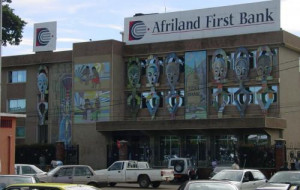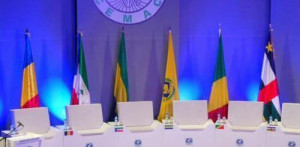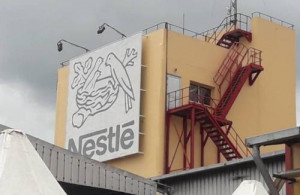
Cemac: Ten banks alone provided over 75% of credit on Beac securities market, at end June 2018
The outstanding debt of the six CEMAC member states on the Bank of Central African States (BEAC) securities market as at 30 June 2018 was XAF1,020 billion, according to the Supervisory Board of the Central Bank's securities settlement and custody unit (CRCT).
Of this amount, XAF766.3 billion was made available by only ten credit institutions, which represents more than 75% of the total financing received by the countries during the period under review.
Top fund providers include four banks in Cameroon (including Afriland First Bank, the leader in this market), which granted XAF 352 billion, representing about 30% of the aggregate amount.
Chadian banks provided XAF232.7 billion, compared with XAF115.8 billion for Gabonese banks and XAF65.8 billion for Banco nacional de Guinea ecuatorial.
Brice R. Mbodiam
Fourth Review of IMF Program scheduled for April 23-May 3, 2019
Cameroon will go through the fourth review of its Extended Credit Facility with the International Monetary Fund (IMF) next April 23 to May 3, reliable sources said.
The country’s capital will thus welcome an IMF mission over the period and the review report will be presented to the international body’s Board in June 2019, subject to the successful performance of the program. So far, Cameroon has successfully passed the first three reviews conducted by Corinne Delechat (photo), Division Chief in the IMF's African Department.
During the last mission held November 5-12, 2018, in Yaoundé, the Division Chief said the 3rd review was ‘satisfactory’ since Cameroon gradually returned to growth set at 3.8% in 2018 against 3.2% in 2017. The 3rd review enabled an additional disbursement of XAF46 billion for a total of XAF85 billion for 2018 alone.
Since this IMF program was launched in June 2017, the country has benefited from a cumulative amount of XAF245 billion approved by the Fund. Let’s note that for the 3-year period from 2017 to 2019, Cameroon is seeking $680.7 million (about XAF396 billion) under the program.
Sylvain Andzongo
Cameroon-CAR traffic resumes, after about a month of suspension due to rebel actions
Freight transport between Cameroon and the Central African Republic via the border city of Garoua-Boulaï, western part of Cameroon, resumed March 28 after about a month of suspension.
The good news is owing to a decision by Central African rebels to break camp at that border they blocked since March 3 to protest against the appointment of the new Prime Minister in their country. Camp was broken after a dialogue was open between parties in Addis Ababa, Ethiopia.
Therefore, the hundreds of trucks loaded with goods, which had been immobilized for several weeks, both in Cameroonian and Central African territory, have now resumed operations.
According to official Cameroonian customs statistics, about XAF55 billion worth of Central African goods transit Cameroon each year.
BRM
Cameroon: Private sector captures only 11% of AfDB investment portfolio
Current investments by the African Development Bank -AfDB- in Cameroon reached XAF177 billion, official sources revealed. Speaking during a meeting with economic operators on March 28 in Douala, the bank’s executives said only 11% of this portfolio was directed to the private sector.
“This is a paradox given that the African Development Bank has mechanisms for private investments. Sadly, these fund vehicles are weakly deployed in Cameroon,” regretted Solomane Kone, AfDB representative in the central African country.
In need to address the situation, the bank set up a strategy seeking to promote private investment in Cameroon, in order to make the sector more competitive, both nationally and regionally.
BRM
CEMAC countries raise XAF391bln on Beac securities market, XAF40bln higher than expectations
Cemac States succeeded in mobilizing a total of XAF391 billion on the Beac securities market, in the second quarter of 2018, an official report said.
Monies far exceed the XAF351 billion initially forecasted to be raised, reflecting strong cash-flow needs facing treasuries in the Cemac countries. The most performing country in this operation is Gabon which raised XAF163.5 billion over the period, against XAF80.7 billion for Chad and XAF69 billion for Cameroon.
Of the money mobilized in Q2 2018 by all six countries, about XAF363.1 billion was collected through treasury bills (BTAs), which are short-term debt securities on which interest is discounted, while only XAF31.5 billion came from fungible treasury bonds (OTAs), which are long-term securities.
BRM
Nestlé stops production of Cameroonian coffee-based Nescafé, over insufficient profitability
Since January 2017, Nestlé Cameroon stopped production of its local coffee-based beverage Nescafé, whose commercialization was launched in January 2015.
According to internal sources at the company that revealed the news, the measure is in response to the lack of profitability for this product packaged in 2-gram bags. They say, the coffee purchased on the local market is shipped to Nestlé Côte d'Ivoire where it is first processed. The semi-finished product is then reshipped to Cameroon for a second processing before being packaged and marketed.
All along this long haul, the company has to pay for customs duties and though fees were reduced thanks to the “outward processing scheme” provided for by the Cameroonian Customs Code, the Nescafé “made in Cameroon” was not competitive on the local market ; a situation that ended the dream of many local coffee growers to benefit from a partnership with Nestlé Cameroon.
Back in 2015, when they were launching the marketing of this beverage, Nestlé Cameroon's managers announced they were planning to terminate partnership with Singaporean Olam to start sourcing from local coffee growers, through cooperatives.
This collaboration with producers was part of a global movement to enable the Swiss food giant to be in direct contact with more than 340,000 coffee growers. The move is already adopted in Côte d'Ivoire and Ghana, but will emerge in Cameroon, to the great displeasure of local producers and the entire coffee sector, which is seeking a helping hand.
Brice R. Mbodiam
Cameroon: Non-oil revenues jumped 111.66% between 2008 and 2018
Cameroonian finance ministry presents budget statistics for the period from 2008 to 2018. Overall revenues improved during the period reviewed.
Non-oil revenues grew from XAF1,277 billion in 2008 to XAF2,703 billion in 2018, up 111.6%. Domestic tax revenues jumped 134.85% from XAF809 billion to XAF1,900 billion. As regard customs revenues, they improved 71.68% from XAF468 billion in 2008 to XAF803.5 billion in 2018 while tax pressure rate was 13% in 2008 and then increased to 16% in 2018.
Despite these good performances, the finance department says, there is still room for improvement since the country still suffers economic crises. “Taxation can contribute to growth, but is not the key growth driver. The size or level of tax levies does not automatically lead to sustained growth or emergence,” the administration says, recommending “a fair, efficient and equitable tax system” so that Cameroon gets back on the track of economic growth and effectively emerging in 2035.
S.A
Cameroon: Booming demand grew Tiger Brands’ turnover by 3% in 2018
The Cameroonian subsidiary of South African food giant Tiger Brands - Chocolateries confiseries du Cameroun (Chococam)- saw revenues grow by 3% in 2018, despite a 9% overall drop in the group’s turnover.
According to a memo on Cameroonian cocoa sector issued March 18 by Fitch Solutions, subsidiary of Fitch Group, “Small volume processing for the domestic market, mainly by Chococam […] should grow driven by higher local demand, for chocolate and other cocoa products. Demand is expected to gradually increase, reaching 63,000 tons in 2023, up from 53,000 tons in 2019.” Higher consumption was also observed in neighboring countries supplied by Chococam.
Increase in turnover can also be explained by the recent product diversification. In a statement dated November 10, 2014, the food company officially extended its corporate purpose, adding the activities of “manufacturing, importing, exporting and trading of personal and household care products and their derivatives.”
The move aligns with Tiger Brands' expansion strategy in Africa, thanks to a partnership with Haco Industries, a Kenya-based manufacturing company. This partnership now allows Chococam to distribute “Miadi” brand cosmetics and a rice brand called “Tastic”.
Chococam, whose performance had been described as “exceptional” by Tiger Brands at the end of 2014, is the group’s top performing unit in Central Africa.
Brice R. Mbodiam
MTN Cameroon achieved positive 2018 results, despite XAF16bln drop in revenues
The Cameroonian arm of South Africa’s MTN group posted positive results last year, official statistics showed. “I think things are looking much more positive. So I think you’re going to see a relatively fast turnaround in WECA,” Rob Shuter, MTN Group’s CEO, said during a meeting with investors.
Despite good performances on the internet and mobile money segments, MTN Cameroon saw turnover drop by XAF16 billion last year, according to a report issued March 7. A situation due to lower voice revenues which fell to R2.7 billion (XAF125.2 billion) in 2018, against R3.02 billion (XAF133.3 billion) in 2017, MTN Group explained. Another reason for the poor performance, Rob says, is the socio-economic instability and overall poor business conditions. Yet, the executive is optimistic; “all the countries around that had e-money licensing regimes, like Cameroon and Benin, made a lot of progress over the same period,” he stressed.
Idriss Linge
Cameroon aims for a XAF60bln Ecobank loan to fund its 3-year Emergency Plan
Cameroonian President Paul Biya inked March 19, 2019 a decree authorizing the finance minister to conclude with Ecoank Cameroon a XAF25 to 60 billion loan agreement.
Monies will partially fund the 3-year Growth Acceleration Emergency Plan (Planut), adopted by the government in December 2014. The plan requires a capital of XAF925 billion.
Focus sectors include agriculture (seed distribution and opening of agricultural roads), health (improving technical capacities of certain hospitals), real estate (construction of 1000 social housing units across the country) and road infrastructure. Overall, 35,000 jobs are expected to be created under the scheme.
Planut is co-financed by five banks including the Cameroonian subsidiaries of BGFI, Standard Chartered Bank, Banque Atlantique, Ecobank and Deutsche Bank of Madrid.
S.A
Mags frontpage
- Most read 7 days
- shared 1 month
- read 1 month








































